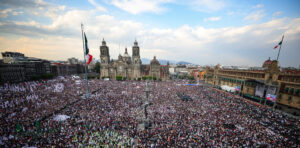WOLA Statement
Mexico has become an especially dangerous place for human rights defenders and journalists, whose work is essential for protecting human rights and exposing abuses. A pending appointment to the Secretary of the Interior’s Human Rights Unit will test the Mexican government’s commitment to protecting these two groups.
Between November 2010 and December 2012, the UN Office of the High Commissioner on Human Rights (OHCHR) documented 89 aggressions against human rights defenders; the OHCHR reported that 22 human rights defenders have been killed since 2006. In the state of Guerrero, seven local activists and human rights defenders were murdered this past year. 2013 was also a violent year for the press in Mexico; the organization Article 19 has reported that there were 330 attacks against journalists and media outlets, including four murders. On March 16, 2014, the house of the director of Article 19 in Mexico was broken into, and computers, work documents, and other valuables were taken.
Given these very real threats against both human rights defenders and journalists, Mexican civil society has urged the Mexican government to take concrete steps to protect both groups. As a result of their work, in 2012 the Mexican Congress passed the Law to Protect Human Rights Defenders and Journalists. This law provided for the creation of a Mechanism to Protect Human Rights Defenders and Journalists (“the Mechanism”), which was a key demand of civil society. The purpose of the Mechanism is to provide an official and effective procedure for human rights defenders and journalists to solicit protection from the government when they come under threat. The U.S. government has recognized the importance of the Mechanism and has provided funds to support its operation, providing assistance and training through Freedom House.
While the Mechanism has finally secured federal funding, it continues to face challenges in consolidating its staff and it has received little support from high-level officials in the Peña Nieto administration or local governments. Human rights organizations have reported that bureaucratic delays have impeded the swift delivery of resources and protection. State and municipal governments, in many cases, have refused to cooperate with the implementation of precautionary measures, making it impossible for the Mechanism to provide effective protection.
The challenges facing the Mechanism have recently been compounded by the March 15 departure of the Director of the Human Rights Unit of the Ministry of the Interior, Juan Carlos Gutierrez. This office plays an important role in human rights policy in Mexico and in coordinating the Mechanism. Mexican human rights organizations and journalists recently sent a letter to the Secretary of the Interior, Miguel Ángel Osorio Chong, urging the Mexican government to make hiring Gutierrez’ replacement a priority. They called on Secretary Osorio Chong to ensure that the new director possess significant experience working with civil society and a strong professional background in human rights. WOLA concurs completely with these requests. If the Mexican government is serious about protecting human rights defenders and journalists, it must show that it is committed to ensuring that the Mechanism works by naming someone qualified to direct the Human Rights Unit. This choice will reveal much about the extent to which the current administration places a priority on human rights and freedom of expression.




